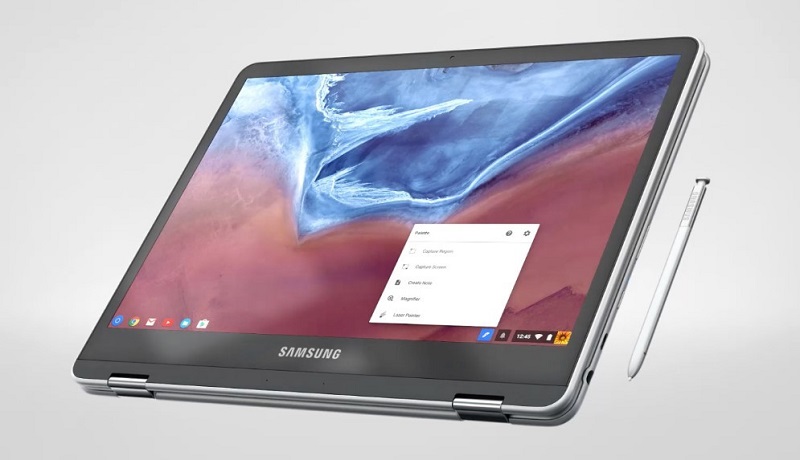This platform has gained strength thanks to the announcement last year that Android applications would be supported directly on these computers, but in 2017 Chrome OS wants to gain much more ground. Convertible formats will join other types of products based on Chrome OS and the stylus will become relevant, but we also have on the horizon that mysterious Andromeda project that wants to merge Chrome OS with Android.
Chromebook launches cheer up
The Samsung Chromebook Pro / Plus launched in the past CES 2017 already surprised us by its screen with resolution of 2,400 x 1,600 pixels, while the Acer Chromebook 11 N7 stood out for their splash resistance or drops. ASUS and its Chromebook Flip C302 appropriated the convertible format, but in recent days, we have seen even more models ready to conquer users.
Today we learned about the launch of the Dell Chromebook 11, which also adopt that format convertible to be able to use in tablet or portable format when we need it.
However, the option that stood out was to support the Productivity Active Pen, the optional pencil that Dell offers to take notes or draw on the screens of these devices. This type of option, already present in others such as the aforementioned Samsung Chromebook Pro, marks a clear turning point in the bet by the touch interface and pointer in these products.

Chromebooks continue to triumph in the educational environment
The fact is that to date the success of these teams has been very limited: its repercussion has been notable in the United States, where Chromebooks have steadily started headlines in campaigns “back to school” in which it has been indicated that Sales of these low-cost laptops have outpaced those of Apple computers, for example.
In October 2016 we were able to see how IDC and Gartner confirmed that success : Apple had dropped 13% in sales from its Macs compared to last year’s “back to school” quarter, with Gartner giving a 13.4% drop in sales.
Chromebooks were not accounted for independently, but they did influence the drop in sales of 3.9% in that period – much smaller than expected for an IDC, which includes them with the PCs – while Gartner, who did not Includes, indicate that the drop in sales of PCs had been 5.7%.
That difference between the two percentages seems to show that the impact of Chromebooks was evident, and Mikako Kitagawa, an analyst at Gartner, said: “Although our PC sales report does not include Chromebooks, our preliminary indicators reveal that Chromebooks outperformed Sales of PCs”.
New formats to view
So far, we’ve seen Chrome OS on all kinds of Chromebooks, but also on Chromeboxes, some HDMI dongle and even All-in-One computers.
Those formats will remain especially relevant in the future of Chrome OS, but the adoption of that “convertible” capability that seems to have convinced manufacturers of these devices will make touch interaction with Chrome OS much more accessible.
Especially now that Android applications will be absolute protagonists in Chrome OS. Google announced this week that all Chromebooks launched this year would support Android applications , and that very important support will give much more value to products that until now competed with few tricks compared to traditional computers with Windows and MacOS.
You may also like to read another article on iMindSoft: How much does Windows 10 and how I can get it for free now that Microsoft no longer gives?
Things will be interesting in the coming months in formats: Rajen Sheth, Android product manager and Chrome for education and the company commented yesterday in a conference that Chrome OS is already being raised as a basis for other types of formats: “You can expect that in the future there will be a laptop with a drop-down screen for tablets [pure] based on Chrome OS.”
This executive also stated that Google has “invested a lot in the touch user interface and in making the touch offer a great experience on the Chromebook,” something that once again shows that convertible touchscreen will be the norm from Now, especially for that ability to interact with Android applications in the most natural way: as we do in our smartphones.
Chrome OS will support Nougat and its floating windows, but there is Andromeda
All these new features will be reinforced by new features that are already ready to make their appearance in Chrome OS. Working with Android applications will be even more striking with Nougat support in Chrome OS.
One of the clear advantages that will come with this support will be the possibility of resizing the windows at will so that they become much more traditional “floating windows” in a desktop environment. There will be no limitations therefore on window size, which are now limited to two or three sizes, and that productivity in Chrome OS will be even more natural.
More promising will still be that project we know as Andromeda and that seems to be the definitive fusion of Chrome OS and Android. This could be Google’s ultimate bet on convergence, and although it seems to take a while to see a smartphone based on Andromeda, there are rumors of a new Pixel 3 that would arrive in 2017 based on this platform.
It seems that Google is now overturned with Chrome OS, a platform that has been successful in educational environments but with all these moves could begin to try to conquer many other lands in which until now seemed to be prohibited. The next months are going to be very, very interesting, so stay tuned.